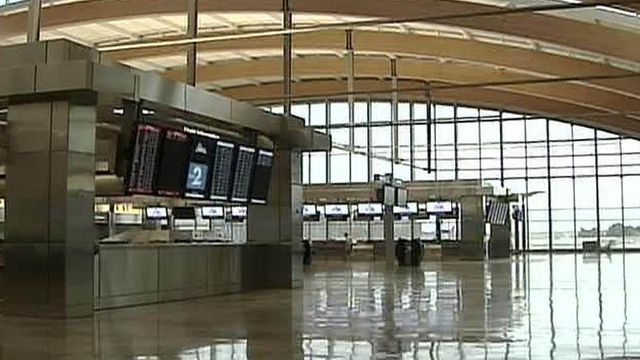Local News
RDU's new terminal opens this weekend
Raleigh-Durham International Airport officials are hoping the opening of the $570 million Terminal 2 will be the ticket to sparking more passengers.
Posted — UpdatedMORRISVILLE, N.C. — Raleigh-Durham International Airport officials are hoping the opening of the $570 million Terminal 2 will be the ticket to sparking more passengers.
The number of passengers flying out of RDU dropped more than 8 percent last month as airlines cut flights, raised fares and increased fees.
“We have a lot of room here to add service, add flights, and even though current times are not so great, the opportunity is there and airlines generally take advantage of the best opportunity,” RDU Airport Director John Brantley said.
The first phased of Terminal 2 opens to travelers Sunday The second phase is scheduled to open in 2011.
It replaces Terminal C, which was built in 1987 as a hub for American Airlines. It is the airport’s first new passenger facility in more than 20 years.
The north concourse of the terminal will feature 19 gates, seven security checkpoint lanes and 26 shops and restaurants in 550,000 square feet. The south concourse will add 13 gates, another seven security lanes and 17 more retailers.
Some of the merchants expected in the new terminal are 42nd Street Oyster Bar, Carolina Ale House, A Southern Season, Brooks Brothers and Apple iPod.
American, American Eagle, Delta, United and Air Canada will initially fly out of the terminal. Continental, Northwest and US Airways will move to Terminal 2 when the south concourse opens.
Also in Terminal 2, a new no-touch passenger security checkpoint system will be in place. The technology will be an alternative to the traditional pat down.
The $177,000 Whole Body Imager uses millimeter wave technology that projects beams of radio frequencies over the body's surface and constructs a three-dimensional image of the body, without clothing, displayed on a remote monitor.
Transportation Security Administration officials, however, say officers in remote locations from the scanners view the images, which are automatically deleted after use. And because faces are concealed, a person's identity is never know
• Credits
Copyright 2024 by Capitol Broadcasting Company. All rights reserved. This material may not be published, broadcast, rewritten or redistributed.






